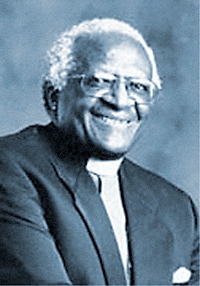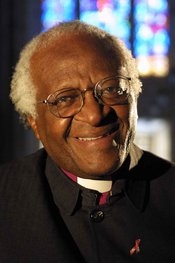Born Oct 7 1931, Desmond Tutu was a one of the world's greatest men. With his leadership he helped many people. Desmond helped Africa change for the better. Desmond grew up in a world with segregation and racial problems and he used this to change his surroundings. Desmond used his knowledge of the Bible and the schools to show the people that anybody can make a change. This is why Desmond won the Nobel Peace Prize in 1984. In the 1980s Archbishop Desmond Tutu became South Africa's most prominent opponent of apartheid, that country's system of racial discrimination.
 |
| Desmond Tutu (Google.com) |
Desmond Tutu’s struggle in the Republic of South Africa was against apartheid, the system with which minority whites of South Africa dominated the black majority until 1994. This system made whites able to control 87% of the natural resources and all meaningful political powers. Desmond became a leading spokesperson for the non-violent resistance to apartheid.
In Klerksdorp, a town in the Tranavaal region, Desmond spent his early childhood going to school in a mission school. When Desmond was 14 he contracted tuberculosis and was hospitalized for a year and 8 months. Desmond had dreams of becoming a doctor but his family could not afford it so he went into teaching. The government instituted a system of racial discrimination on education so he left teaching and started an Anglican Church. In 1962 Desmond earned a B.A. from the University of South Africa. A few years later he earned a B.D and a Master of Theology from the University of London. From 1970 to 1974 he went to several different schools. In 1975 he became the Dean of St. Mary's Cathedral in Johannesburg.
 |
| Desmond Tutu (Google.com) |
By the 1980's many problems began to happen in South Africa and with apartheid. Desmond's international recognition as a critic of apartheid came when he became first General Secretary of the South African Council of Churches in 1978. The problem faced by anti-apartheid clergymen was how to simultaneously oppose both violent resistance and apartheid. This increased violence. Another problem Desmond faced was if any other nations should be urged to apply economic sanctions against South Africa. The problems against sanctions were that those who would suffer most would most likely be black.
In 1989 F.W. de Klerk was elected president and promised to abolish the apartheid and, at the end of 1993, he made good promises with Desmond.
Page created on 3/26/2006 12:00:00 AM
Last edited 3/26/2006 12:00:00 AM
